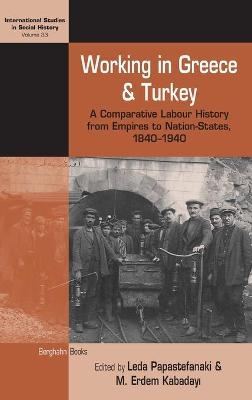
Working in Greece and Turkey
Berghahn Books (Verlag)
978-1-78920-696-8 (ISBN)
As was the case in many other countries, it was only in the early years of this century that Greek and Turkish labour historians began to systematically look beyond national borders to investigate their intricately interrelated histories. The studies in Working in Greece and Turkey provide an overdue exploration of labour history on both sides of the Aegean, before as well as after the fall of the Ottoman Empire. Deploying the approaches of global labour history as a framework, this volume presents transnational, transcontinental, and diachronic comparisons that illuminate the shared history of Greece and Turkey.
Leda Papastefanaki is an Associate Professorof Economic and Social History at the University of Ioannina, Greece and Collaborating Faculty Member at the Institute for Mediterranean Studies/FORTH, Rethymno, Greece.
List of Illustrations
Acknowledgements
Introduction and Historiographical Essay: Greek and Turkish Economic and Social History, and Labour History
Leda Papastefanaki and M. Erdem Kabadayı
Part I: Agrarian Property and Labour Relations, Rural and Urban Organization of Work
Chapter 1. Were Peasants Bound to the Soil in the Nineteenth-Century Balkans? A Reappraisal of the Question of the New/Second Serfdom in Ottoman Historiography
Alp Yücel Kaya
Chapter 2. The ‘Invisible’ Army of Greek Labourers
Christos Hadziiossif
Chapter 3. ‘No Work for Anyone in this Country of Misery’: Famine and Labour Relations in Mid-Nineteenth-Century Anatolia
Semih Çelik
Chapter 4. Rural Manufacturing in the Mid-Nineteenth-Century Ottoman Countryside: Textile Workers in Three Plovdiv Villages
Fatma Öncel
Chapter 5. Ethno-religious Division of Labour in Urban Economies of the Ottoman Empire in the Nineteenth Century
M. Erdem Kabadayı and Murat Güvenç
Digital Appendix 5.1: Ethno-religious composition of observations in locations (.xlsx)
Digital Appendix 5.2: PST2s and ethno-religious affiliations (.xlsx)
Digital Appendix 5.3: PST2s in 16 locations (.xlsx)
Part II: Political Change, Migration, and Nationalisms
Chapter 6. Class Formation on the Modern Waterfront: Port Workers and Their Struggles in Late Ottoman Istanbul
Akın Sefer
Chapter 7. Labourers, Refugees, Revolutionaries: Ottoman Perceptions of Armenian Emigration
Sinan Dinçer
Chapter 8. The Greek Labour Movement and National Preference Demands, 1890–1922
Nikos Potamianos
Chapter 9. Refugees, Foreigners, Non-Muslims: Nationalism and Workers in the Silahtarağa Power Plant, 1914–24
Erol Ülker
Part III: Labour Market and Emotions in the Twentieth Century
Chapter 10. “Fatherly Interest…”: Industrial Paternalism, Labour Management, and Gender in the Textile Mills of a Greek Island (Hermoupolis, Syros, 1900–1940)
Leda Papastefanaki
Chapter 11. The Changing Organization of Production and Modes of Control, and the Workers’ Response: The Turkish Textile Industry in the 1940s and 50s
Barış Alp Özden
Chapter 12. ‘It is Fair to Ask for the Improvement of Their Fate’: The Demands, Mobilization, and the Political Orientation of the Press Workers and Printers of Patras, 1900–1940
Asimakis Palaiologos
Chapter 13. Children’s Domestic Labour: Intimate Relations, Family Politics, and the Construction of Identity of Domestic Workers in Interwar Greece
Pothiti Hantzaroula
Epilogue
Leda Papastefanaki and M. Erdem Kabadayı
Index
| Erscheinungsdatum | 03.08.2020 |
|---|---|
| Reihe/Serie | International Studies in Social History |
| Verlagsort | Oxford |
| Sprache | englisch |
| Maße | 152 x 229 mm |
| Themenwelt | Geisteswissenschaften ► Geschichte ► Regional- / Ländergeschichte |
| Geschichte ► Teilgebiete der Geschichte ► Kulturgeschichte | |
| Sozialwissenschaften ► Soziologie ► Mikrosoziologie | |
| ISBN-10 | 1-78920-696-0 / 1789206960 |
| ISBN-13 | 978-1-78920-696-8 / 9781789206968 |
| Zustand | Neuware |
| Haben Sie eine Frage zum Produkt? |
aus dem Bereich


